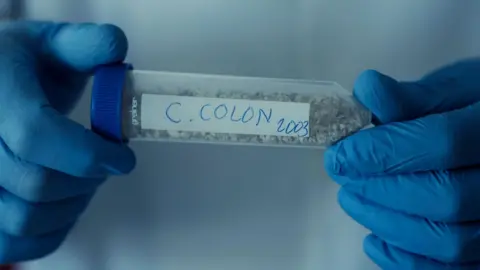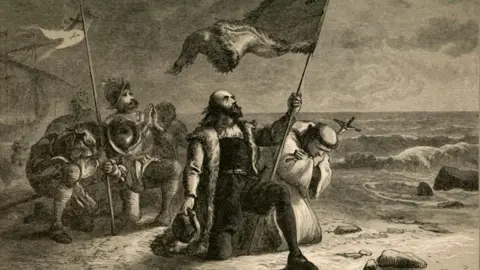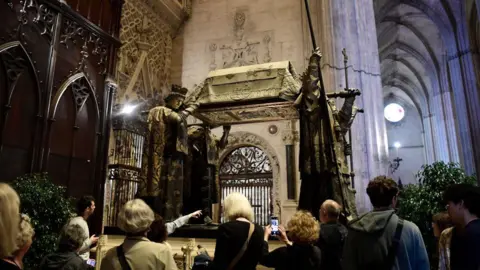
 RTVE
RTVEMore than five centuries after he reshaped history by opening the New World to European exploration, scientists say they are ready to reveal the truth about Christopher Columbus' origins.
The explorer reached America in 1492 with the support of the Spanish Crown.
Although mainstream history books describe him as being from Genoa, uncertainty surrounds his origins, with many countries and regions claiming him as their own.
Now, after more than two decades of research, scientists say they have enough evidence to resolve the dispute over Columbus' birthplace.
In 2003, José Antonio Lorente, professor of forensic medicine at the University of Granada, and historian Marcial Castro exhumed Columbus's probable remains from the cathedral in Seville to collect DNA samples. They also took DNA from the bones of his son Hernando and brother Diego.
Since then, they have been comparing the DNA of historical figures from different countries and regions to solve the mystery, using technological advances to ensure the veracity of the results.
 Getty Images
Getty ImagesThe answer is expected to be revealed in a documentary to be broadcast by Spain's national broadcaster RTVE on Saturday, which is a national holiday commemorating Columbus' arrival in the Americas.
Before the release of the film, described as a “documentary thriller”, the forensic team revealed one of the results of their research: that the remains exhumed in Seville actually belonged to the discoverer.
The Dominican Republic has long claimed host to his body, and a mausoleum has been dedicated to him in the city of Santo Domingo.
Presenting this discovery, Professor Lorente stated that “thanks to the new technology, we have managed to prove beyond any doubt the previously unconfirmed theory that the remains in Seville belong to Christopher Columbus.”
However, the team said it is possible that some of the discoverer's remains are in the Dominican Republic, which did not cooperate with the project.
The biggest mystery, however, is the birthplace of Columbus.
 Getty Images
Getty ImagesA widely accepted theory is that he was born in Genoa in 1451 into a family of wool weavers.
In 1492, he led an expedition supported by the Spanish Catholic monarchs to establish a new route to the Far East.
Instead, it reached the Caribbean, beginning a period of European contact with the Americas that led to conquest and settlement, and the deaths of many millions of indigenous peoples from disease and war.
It is generally accepted that Columbus died in 1506 in the northern Spanish city of Valladolid.
There are an estimated 25 separate claims to his place of birth, including from Poland, Scotland, Hungary and Scandinavia.
However, Professor Lorente's team narrowed the list of candidates to eight possible birthplaces: Spain, Portugal and Italy. The process involved comparing Columbus' DNA with the DNA of people believed to be his relatives in those locations.
On the short list is the north-western region of Spain – Galicia. The same goes for the Balearic Islands, Majorca, with the theory that Columbus was the illegitimate son of Prince Viana, brother of King Ferdinand, who supported his groundbreaking expedition.
Another hypothesis is that Columbus was a Jew from the Mediterranean port city of Valencia. According to this theory, his obscure origins can be explained by the fact that he tried to hide his Jewish origins to avoid persecution by the staunchly Catholic Spanish monarchs.
Elsewhere in Spain, the regions of Navarre and Castile-La Mancha also claim Columbus' descent. In Portugal, one theory is that the discoverer was a pirate nobleman whose real name was Pedro de Ataíde.
Before the broadcast, RTVE provided tantalizing hints, including that the results would “revolutionize everything we have studied” about Columbus. However, Marcial Castro, who was involved in the project, said in the trailer that he considered the “traditional Genovese theory” to be the most obvious one worth supporting as a historian.
In a statement, Professor Lorente said his team “continues to analyze very important recent data” which will not impact the content of the paper but will be of scientific interest and will be presented in November along with the full results of his team's research.
Colon ADN program. Su verdadero origen (Columbus' DNA: His True Origin) will be broadcast on Spain's TVE 1 on Saturday at 10:30 p.m. (8:30 p.m. GMT).
